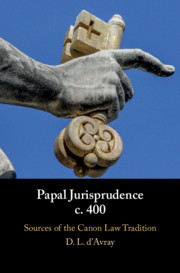Book contents
- Papal Jurisprudence c. 400
- Papal Jurisprudence c. 400
- Copyright page
- Dedication
- Contents
- Acknowledgements
- Abbreviations
- Manuscript Sigla
- 1 Introduction
- 2 The State of Research: Caspar and After
- 3 Texts and Manuscripts
- 4 Rituals and Liturgy
- 5 Status Hierarchy
- 6 Hierarchy of Authority
- 7 Celibacy
- 8 ‘Bigamy’
- 9 Marriage
- 10 Monks and the Secular Clergy
- 11 Heretics: Novatians, Bonosians, and Photinians
- 12 Heretics: In the Shadow of Augustine
- 13 Penance
- Epilogue
- Select Bibliography
- Index
7 - Celibacy
Published online by Cambridge University Press: 13 December 2019
- Papal Jurisprudence c. 400
- Papal Jurisprudence c. 400
- Copyright page
- Dedication
- Contents
- Acknowledgements
- Abbreviations
- Manuscript Sigla
- 1 Introduction
- 2 The State of Research: Caspar and After
- 3 Texts and Manuscripts
- 4 Rituals and Liturgy
- 5 Status Hierarchy
- 6 Hierarchy of Authority
- 7 Celibacy
- 8 ‘Bigamy’
- 9 Marriage
- 10 Monks and the Secular Clergy
- 11 Heretics: Novatians, Bonosians, and Photinians
- 12 Heretics: In the Shadow of Augustine
- 13 Penance
- Epilogue
- Select Bibliography
- Index
Summary
Celibacy is a strong theme in the earliest papal legislation and it is connected with both kinds of hierarchy. The connection with status hierarchy is strongest as celibacy marked off the deacons, priests, and bishops from lower levels of clerical status, but the ‘celibacy line’ is also linked to command hierarchy, as deacons, the first level of hierarchy of which celibacy was required, were key figures in the government of episcopal churches, notably at Rome, where they were more powerful than priests. The clerical celibacy of late Antiquity is a different sort from that of the eleventh-century Gregorian Reform. In the second half of the fourth century the Roman Church began to enforce the rule that clerics should give up sex if they wanted to be promoted to deacon, though they would not separate from their wives (below which there were a series of levels where clerics could be sexually active with their wives). This celibacy rule may have arisen to help the ordinary clergy keep up with monastic asceticism, but its rationale and function was to mark out the separateness of those who came closest to the Eucharist.
- Type
- Chapter
- Information
- Papal Jurisprudence c. 400Sources of the Canon Law Tradition, pp. 133 - 151Publisher: Cambridge University PressPrint publication year: 2019



